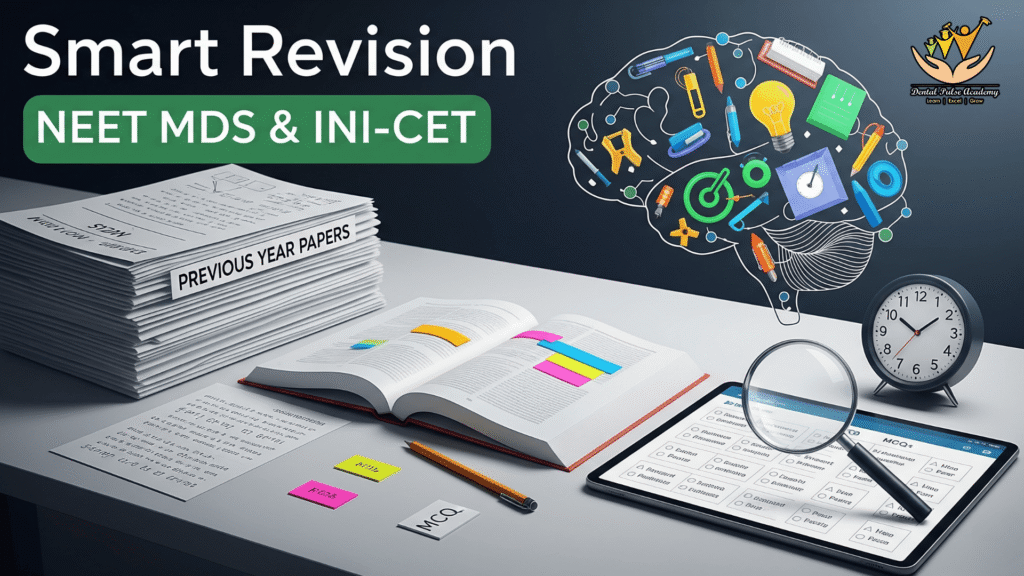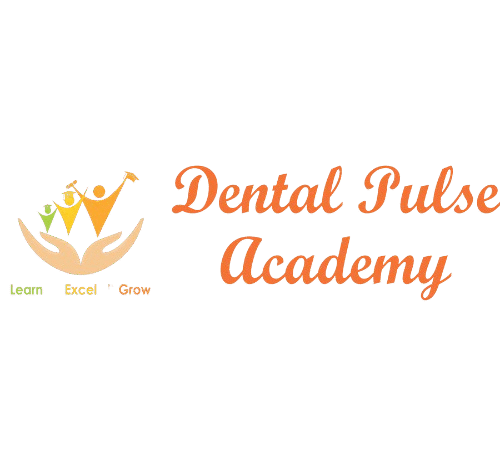
Introduction
Competitive exams such as NEET MDS and INI-CET require not only hard work, but a smart approach too. Aspirants invest hours in studying regular textbooks, notes, and reference books, but do not perform well since they don’t practice sufficient Multiple Choice Questions (MCQs) or evaluate previous year papers (PYQs). In fact, these two resources are the best way of revision. Not only do they assist in recalling knowledge, but also habituate the mind to think in the pattern of exams.
In this blog, we are going to discuss how to effectively use MCQs and previous year papers for smart revision, why they are important, and useful tips you can follow in your preparation path.
Why MCQs and Previous Year Papers Are Important
- Know the Exam Pattern:
- MCQs acquaint you with the format and structure of the questions posed.
- PYQs mirror actual trends of difficulty, subject weightage, and recurring topics.
- Application of Knowledge:
- Reading is passive; answering MCQs forces you to apply the concepts.
- Both conceptual understanding and memory are tested.
- Time Management Training:
- MCQ practice replicates the actual exam environment.
- You understand how much time needs to be spent on each question.
- Identify Strengths and Weaknesses:
- Practice on a regular basis indicates which topic or subject requires more attention.
- You can revise accordingly.
- Boost Confidence:
- Knowing the pattern of questions minimizes anxiety.
- PYQs reveal that numerous questions are repeated or distorted forms of previous ones.
Step 1: Selecting the Right MCQs and PYQs
- Begin with Reputed Sources: Utilize reliable materials such as Dental Pulse, Dentist Channel Online compilations, or institutional question banks.
- Previous Year Papers (At Least 10 Years): Collect, and group NEET MDS and INI-CET past papers.
- Online Test Series: Platforms like Dental Pulse Academy provide simulated tests that mirror the real exam.
Tip: Avoid low-quality or unverified MCQs from random online sources; they may misguide your preparation.
Step 2: How to Approach NEET MDS MCQs Practice
- Topic-Wise Practice:
- After reading a chapter, solve related MCQs immediately.
- This reinforces concepts and highlights weak areas.
- Daily Practice Routine:
- Solve 100–150 MCQs per day during the peak preparation phase.
- Mix subjects to simulate real exam conditions.
- Timed Sessions:
- Practice MCQs with a stopwatch to mimic exam pressure.
- Train yourself to attempt questions within 60–80 seconds.
- Use the Elimination Technique:
- If unsure, eliminate incorrect options logically.
- Usually, you can reduce it to 2 options.
- Error Notebook:
- Keep a special notebook for the wrong MCQs.
- Put down the correct option and a short reason.
- Update this notebook once a week.
Step 3: How to Use Previous Year Papers Effectively
- Identify Repeated Topics:
- Topics such as Oral Pathology, Prosthodontics, and Endodontics tend to have repeating themes.
- Concentrate extra on these high-yield topics.
- Trend Analysis:
- Analyze changes in weightage over years (e.g., clinical-based vs. fact-based questions).
- Modify your preparation plan accordingly.
- Simulated Exams:
- Complete full previous year papers in a 3-hour environment.
- This increases endurance and accuracy for the actual test.
- Post-Test Review:
- Take more time reviewing errors than working through them.
- Realize why the correct answer is correct, not merely what it is.
- Cross-Link with MCQs:
- Numerous PYQs are identical to regular MCQs that you practice.
- Find repeated questions for reinforcement twice over.
Step 4: Incorporating MCQs & PYQs in Your Study Schedule
- Early Phase (First 3–4 Months):
- Subject-wise reading + NEET MDS MCQs after each chapter.
- Utilize PYQs to direct key topics.
- Middle Phase (Next 3 Months):
- Practice MCQs daily in larger numbers.
- Complete at least one PYQ paper every 10 days.
- Begin revising your error notebook.
- Final Phase (Last 1–2 Months):
- Transition to full-length mock tests + PYQs.
- Rework only high-yield notes and error log.
- Emphasis on speed and accuracy.
Common Errors Made by Students
- Reading Only Without Practice: Memorization but not practice.
- Solving Unsystematic MCQs: Time waste on poor quality question banks.
- Not Going through Errors: Practicing questions but not reading incorrect answers.
- Excessive Focus on Single Subject: Skipping balance over 19 subjects.
- Last-Minute Cramming: Attempting to complete un-covered topics just before the exam rather than reinforcing strengths.
Intelligent Tips for Maximizing Output
- Adhere to the 70-20-10 Rule:
- 70% of time for MCQ practice.
- 20% of time for studying PYQs.
- 10% of time for theoretical reading.
- Employ Flashcards for High-Yield Facts:
Especially for topics such as Pharmacology and Pathology. - Group Discussions: Explain PYQs to fellow students; teaching others solidifies your own ideas.
- Digital Tools: Utilize apps or online test series to monitor progress and performance.
- Mindset Matters: Approach every MCQ and PYQ as a learning device, not merely an examination.
Conclusion
For NEET MDS and INI-CET candidates, to master the examination is not as much about reading every single page of all the books, but about *practicing smart. NEET MDS MCQs prepare your mind for on-the-job problem-solving, while previous year papers give you the template of the examination.
If you use both to the optimum, keep an error notebook, and have a planned revision schedule, you can reach your maximum potential of preparation and sit in the examination hall with confidence.
Recall: It’s not so much what you read, but how wisely you revise. And MCQs along with PYQs are the wisest revision strategies you can employ.
✅ Action Step for You: Pick one subject today itself (e.g., Oral Pathology). Revise it lightly, then do 50 MCQs and go through 2 years of previous year questions. Observe how much improved your recall becomes!
If you have any questions about NEET MDS & INI-CET revision, feel free to get in touch.
Phone: [92462 10072| 99536 10072]
instagram [dentalpulseacademy]
Website: [https://dentalpulseacademy.com/]
linkedin : [ Dental Pulse Academy Official ]
